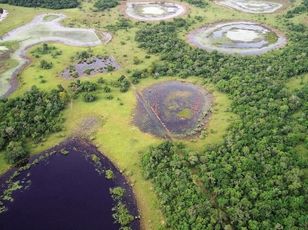
For the better part of two decades, biologists Alexine Keuroghlian and Donald Eaton have made it their mission to attempt to understand the Pantanal's complex and diverse ecosystem. Although they are studying very different aspects of the region, both are working toward a common goal — to understand the biological and environmental effect cattle ranching is having on this vital region.
Keuroghlian's specialty is peccaries, a pig-like animal that uses the Pantanal and adjacent areas as its home. They have been significantly affected by the fragmenting of habitat into small secluded "islands" because of the demands placed on the region by pasturing cattle. Eighty percent of the beef consumed in Brazil is raised in the Pantanal.
"The number of organisms that call the Pantanal home is staggering and virtually unrivaled on earth," Keuroghlian said. "It is an area we all need to be concerned about protecting because it is such a large part of the fabric of life on Earth."
Keuroghlian, a scientist with the Wildlife Conservation Society based in New York, had the students working hard on the very first day. While on the project, they are were responsible for the moving, setting and baiting of traps and tracking peccaries that had been collared using radio telemetry. The captured animals were sedated to reduce stress while the students took their vital measurements. Keuroghlian took blood samples for DNA analysis and microchipped the animals for later identification.
More information on http://www.seacoastonline.com/articles/20120829-NEWS-208290320